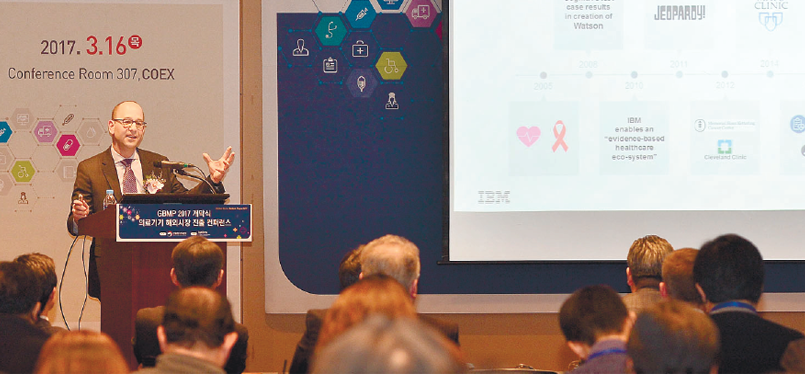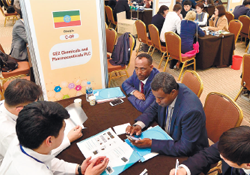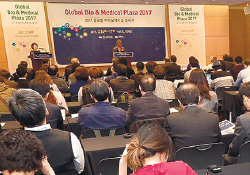

As Korea faces a rapidly aging population,
the country is looking for new ways to combine
technology and the healthcare
According to the World Health
Organization, the average life
expectancy in South Korea is
82.3. Pundits expect this number
to grow even higher in the future,
especially as the country’s latest IT technology
is fusing with healthcare and medical
industries. To further spur lively discussion
on this topic, KOTRA and the
Ministry of Trade, Industry and Energy
(MOTIE) held the Global Bio & Medical
Plaza (GBMP) 2017 on the sidelines of
the 33rd Korea International Medical &
Hospital Equipment Show (KIMES) on
March 16-17 in Seoul, South Korea.
This year’s event, which first kicked off
in 2008, was comprised of one-on-one
business meetings, seminars and forums
on the global healthcare industry. Over
200 foreign buyers from 59 countries and
280 Korean companies specializing in
medical supplies and equipment attended
the event.
“The medical industry is rapidly changing
due to technological advancements,
which is good news for Korea’s healthcare
market,” said Kim Doo Young,
KOTRA’s Executive Vice President for
Strategic Marketing, during his opening
remarks. “With the country soon to welcome
the fourth industrial revolution, this
convergence of ICT technology and
healthcare will bring about new opportunities
for innovation. That’s why events
like GBMP are so significant.”
As one of the world’s fastest growing
industries, the medical device market is worth
USD 337 billion, with
this number likely to hit USD 440 billion by 2020.
Korea, meanwhile, is home to the ninth
biggest medical device market, and its
export volume is estimated to be worth
USD 2.6 billion.
Against this backdrop, KOTRA invited
several guest speakers in the medical and
healthcare industry to GBMP, including
Dr. Andrew Norden, Deputy Chief Health
Officer at IBM Watson Health. Like
Korea, IBM is ushering in a new era of
technology, aspiring to improve lives and
give hope by addressing the world’s most
pressing health challenges through cognitive
computing. Its cognitive computing
platform has an advanced ability to analyze
the meaning and context of data in
clinical notes and reports, and has been
taught to make diagnosis for patients
based on medical images. IBM Watson Health is

taking its technology overseas as well, collaborating with a number of big hospitals in Asia. Many hospitals in Asia are currently using Watson for Oncology. “In Korea, Gil Medical Center and Pusan National University Hospital are informing patients about their conditions and possible treatments through our system,” said Norden. “We’re excited to work with more Korean companies and hospitals in the future.”

Along with information on the latest medical trends, GBMP provided seminars for Korean suppliers wishing to enter the overseas markets, including the National Health Service in England and the medical device market in Hungary. Furthermore, Dr. John Wagacha Burton, Senior Public
Health Officer of the United Nations High Commissioner for Refugees, touched upon the agency's operations and collaboration opportunities in Kenya's medical field. One-on-one business meetings and MOU ceremonies were also held during the event, further expanding Korea’s medical network on a global scale. 29 contracts were signed between foreign buyers and Korean suppliers as a result, with export contracts and MOUs amounting to USD 11.3 million. KOTRA doesn’t plan on stopping with events like GBMP to spur the growth of Korea’s healthcare industry. According
to Kim Doo Young, the agency will dispatch a medical mission to Latin America, the Middle East, Southeast Asia and other regions to nurture promising healthcare industries and diversify export markets.
IBM Watson Health’s
Major Cooperation Projects in Korea
Last year alone, nearly 44,000 oncology research papers were published in medical journals around the world. This amounts to nearly 122 new papers published every day, outpacing the ability of humans to keep up with the proliferation of medical knowledge. Using natural language processing, clinicians using IBM’s Watson for Oncology is able to quickly extract clinically relevant information from this trove of data to gather evidence specific to a patients’ individual health needs. Watson for Oncology has ingested nearly 15 million pages of medical content, including more than 200 medical textbooks and 300 medical journals. Watson provides doctors with access to information from peer reviewed studies, clinical guidelines and expert perspectives. IBM Watson Health is working with the following Korean organizations to spur the growth of the AI and health industries.
Gachon University Gil Medical Center adopted IBM Watson for Oncology trained by Memorial Sloan Kettering, which is designed to provide physicians with evidence-based medical treatment options. The cloud-based platform analyzes large
volumes of structured
and unstructured data to help physicians offer
individualized, data-driven treatment
options for cancer patients. This is the
first deployment of IBM Watson in
Korea.
Located in Incheon, Gachon University
Gil Medical Center is the fifth largest of
Korea’s general hospitals with 1,400
licensed beds. Oncologists at Gil Medical
Center care for 50,000 cancer patients
each year. IBM is working with Gil
Medical Center to localize the offering
based on Korean medical guidelines and
language needs.
This deal with Gil Medical Center
shows ongoing momentum for Watson in
the Korea market.
Pusan National University Hospital adopted IBM’s Watson for Oncology and Watson for Genomics in its treatments as part of its efforts to lead the domestic precision medicine sector. It is the first time that a Korean hospital introduced the two technologies altogether. The new software programs help clinicians to analyze the massive amounts of data including research findings and patients’ genetic information to offer individualized treatment options.
Precision medicine is a new approach
for disease treatment that analyzes a
patient’s genetic profile, medical records,
clinical data and even lifestyle to provide
targeted treatments for each patient. The
global precision medicine market is growing
by 11 percent annually, and is expected
to reach about KRW 136 trillion (USD
121.18 billion) by 2025, up from KRW
35 trillion (USD 31.19 billion) in 2015.
The United States, United Kingdom,
China and France are scrambling to establish
precision medicine research cohorts
to expand their scope of investments and
digitize a vast array of genetic content.
Keeping up with this trend, Korea has
also recently included precision medicine
in its agendas for nine national strategic
projects, accelerating efforts to create a
relevant infrastructure and an ecosystem
for the sector’s long-term growth.
